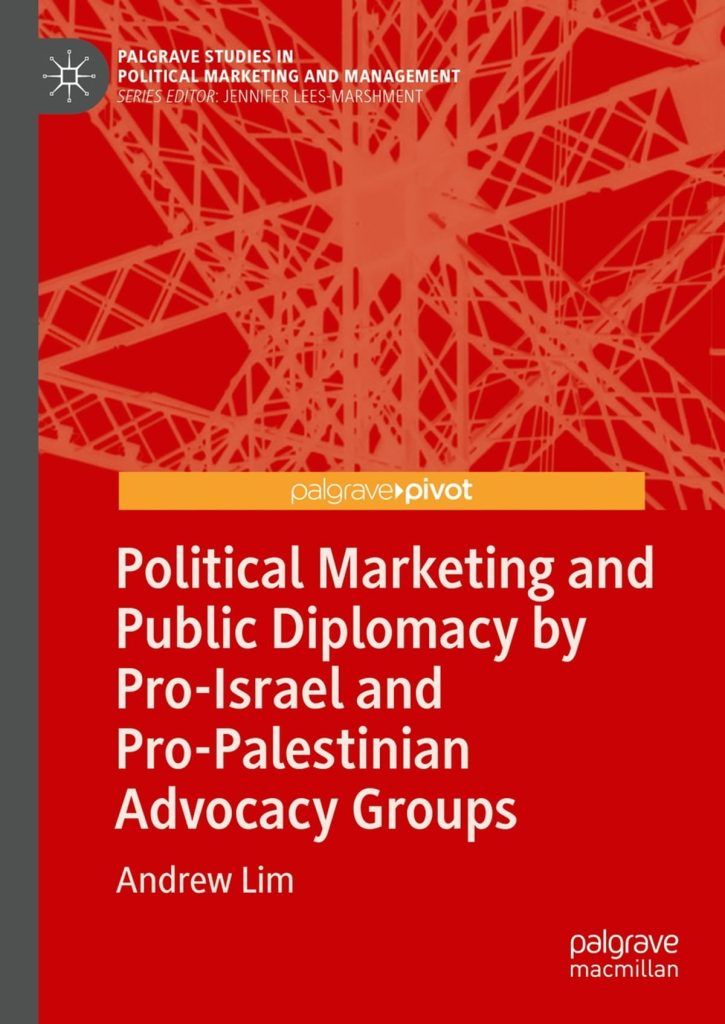Australia/Israel Review
Biblio File: A Marketing Microscope
Mar 1, 2023 | Jamie Hyams
 Political Marketing and Public Diplomacy by Pro-Israel and Pro-Palestinian Advocacy Groups
Political Marketing and Public Diplomacy by Pro-Israel and Pro-Palestinian Advocacy Groups
Andrew Lim
Palgrave Macmillan, Oct. 2022, 149 pp., A$82.96
New Zealander Andrew Lim’s monograph Political Marketing and Public Diplomacy by Pro-Israel and Pro-Palestinian Advocacy Groups is derived from the author’s PhD research into how political marketing can be utilised outside of party politics by advocacy groups. He uses as case studies two pro-Israel advocacy groups and two pro-Palestinian advocacy groups: New Zealand’s Palestine Solidarity Network Aotearoa (PSNA) and Israel Institute of New Zealand (IINZ), and Australian-based groups, the Australia/Israel & Jewish Affairs Council (AIJAC) and Australia Palestine Advocacy Network (APAN).
Rather than passing judgement on the merits of the causes the respective organisations seek to advance, Lim seeks to “break new ground within the political marketing literature” and to ascertain whether the groups conform to specific types of marketing models.
He describes the two pro-Israel groups as “sales-oriented groups”, while the pro-Palestinian organisations are “product-oriented advocacy groups,” the difference being that the former “were willing to use market intelligence to identify and target segments that were pro-Israel and could influence public opinion and government policies towards Israel.”
To arrive at these conclusions, he studied extensive primary materials from each group (1,898 webpages, social media posts, audio-visual and printed material), as well as secondary sources about the groups, supplemented by interviews with office-bearers representing some of them.
In describing the aims and activities of each group, Lim strives to maintain a neutral, non-judgmental tone, and largely succeeds, often placing anti-Israel slurs in quotation marks, for example, although at times adopting the rhetoric of the organisation being profiled. On occasion, the mask of neutrality appears to slip a little towards the pro-Palestinian groups. For instance, he regularly describes the BDS campaign as seeking “to advance Palestinian rights and self-determination by applying economic and social pressure on Israel,” while accusations that the campaign is antisemitic are “alleged”.
He also describes one AIJAC strategy as “shifting blame” onto the Palestinians, rather than, for example, “apportioning blame”. Furthermore, in discussing APAN, he refers to the Australian Coalition’s “claim to support a two-state solution.” While APAN may be cynical on this point, it is clear that this is what the Coalition does support. IINZ and AIJAC activities are described as including “combating both real and perceived anti-Semitism and anti-Zionism” (my underlining), while the PSNA and APAN “supported many key Palestinian goals, such as advancing Palestinian rights, justice and statehood” (rather than perceived Palestinian rights and justice).
It is hard to assess the accuracy of Lim’s findings in relation to the PSNA, IINZ and APAN, but in relation to AIJAC there are various errors and omissions. Admittedly, Lim was handicapped by an AIJAC policy of not speaking to researchers about its activities, a point he stressed several times, conceding his conclusions were “highly speculative”. However, some errors were easily avoidable, such as continually referring to the Rambam program, in which AIJAC takes groups on study visits to Israel, as “Ramban”. His examples of those who participated, and of AIJAC activities in general, omitted many of the most prominent and important.
Elsewhere, he refers to the AIJAC Forum as an “internship programme”, whereas it was, in fact, a largely autonomous volunteer group that AIJAC supported.
There were also some very questionable generalisations, such as stating that AIJAC frames “opposition to Israel as being motivated by anti-Semitism.” While it is true that some opposition to Israel is motivated by antisemitism, there are other causes that AIJAC also discusses regularly, including Palestinian nationalism, geopolitics, a left-wing mindset that sees Palestinians as victims of colonialism, groupthink in some elements of the media and sheer ignorance.
Overall, the book is a mildly interesting if patchy rundown of the activities and strategies of the four groups profiled, albeit from someone lacking expertise in the subject matter that is the focus of those groups. However, its conclusions are directed at those interested in political marketing theory, rather than Middle East politics.
Tags: AIJAC, Australasia, Australia






